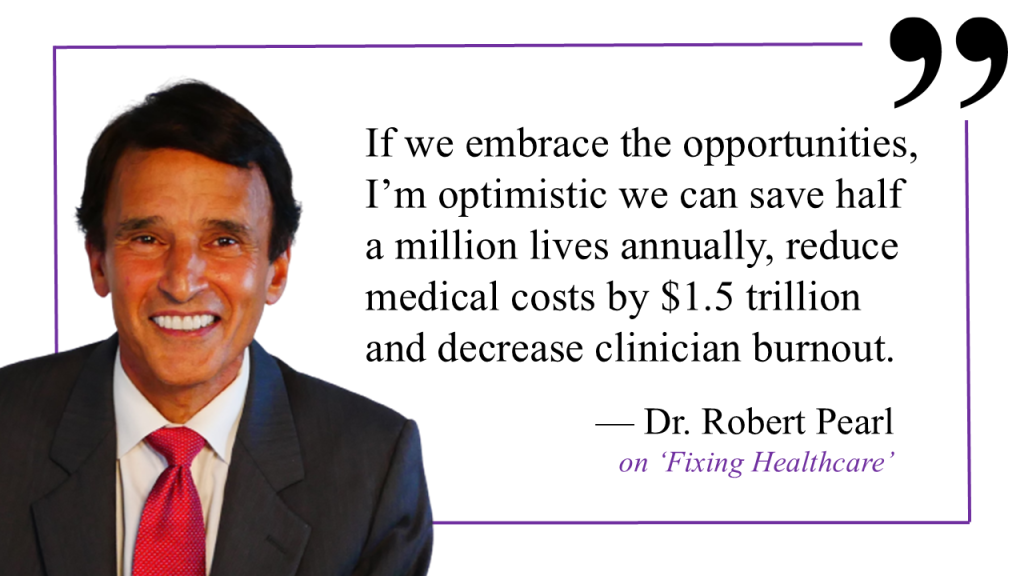Podcast: Play in new window | Download
Subscribe: Spotify | Email | RSS | More
In a special episode of Fixing Healthcare, Jeremy Corr turns the mic once more to cohost Dr. Robert Pearl, inviting him to reflect on Season 10, marking the duo’s most ambitious deep-dive into the technologies transforming American medicine.
Over the past nine episodes, Corr and Pearl welcomed leading thinkers in health tech, including high-profile executives from Microsoft, Google, Oracle and Nvidia; the CEOs of Zocdoc and Hippocratic AI; pioneers of generative AI like investor Vinod Khosla; and renowned physician-leaders like Drs. Eric Topol and Maria Ansari.
This week, Corr and Pearl offer listeners a wide-angle view of what they learned … and what comes next.
Pearl begins by identifying four major “eras” of healthcare technology. The first was defined by anatomic understanding and miracle drugs. The second brought powerful machines like CT and MRI. The third saw the arrival of EHRs and the internet, technologies that failed to meet expectations. The fourth era, he says, began on “November 30th of 2022, with the release of OpenAI’s ChatGPT.”
Since then, Pearl notes, generative AI has at least doubled in power annually. “By the time the current cohort of medical students complete their training,” he says, “generative AI will be at least 30 times more powerful than today. That’s the equivalent of your car going as fast as an airplane.”
Corr asks Pearl to walk through what stood out most from the season’s interviews. Pearl highlights Dr. Topol’s focus on “precision preventive care,” David Feinberg’s vision of AI as a personal assistant, and Vinod Khosla’s belief that “AI won’t replace 80% of doctors, but it will replace 80% of what doctors do.” Others predicted tech-enabled call centers, hospital-at-home programs, and smarter EHRs that anticipate a clinician’s needs.
Before the episode ends, Corr asks Pearl to summarize his own top three technologies for the next five to 10 years. Pearl’s answer mirrors — but also expands upon — his earlier appearance in episode #170. Here are the three innovations he believes will have the greatest impact:
- Large language models (LLMs): Pearl believes tools like ChatGPT, Gemini and Claude will soon be able to monitor patients with chronic illnesses in real time, helping them identify when medication adjustments or clinical interventions are needed (without requiring an in-person visit).
- AI-enabled telemedicine: When paired with generative AI, telemedicine will evolve from a one-to-one model to a one-to-many approach. Pearl envisions a future in which doctors can oversee and manage care for dozens — or even hundreds — of discharged patients simultaneously, responding quickly to those who need the most attention.
- AI-powered assistants: Tools like DeepSeek will spark a new generation of digital healthcare agents trained on real clinician–patient interactions. These assistants will handle triage, chronic disease management and home monitoring, making expert-level care more accessible, scalable and affordable than ever before.
Pearl ends with a bold forecast: “I’m convinced that over the next five to 10 years, the combination of dedicated clinicians and empowered patients and generative AI technology will achieve clinical outcomes that are exponentially better than what any of the three could achieve alone.”
Click play to hear this wide-ranging wrap-up to Season 10, including predictions for medicine’s future and a call to action for patients, clinicians and tech innovators alike.
* * *
Fixing Healthcare is a co-production of Dr. Robert Pearl and Jeremy Corr. Subscribe to the show via Apple, Spotify, Stitcher or wherever you find podcasts. Join the conversation or suggest a guest by following the show on Twitter and LinkedIn.

